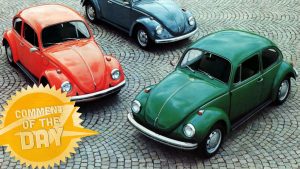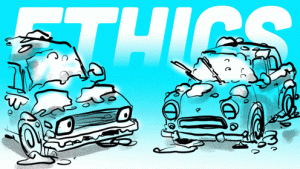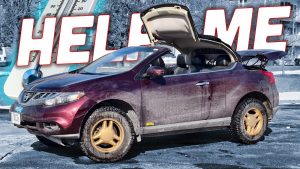Car badges! When was the last time you considered, I mean really hand-on-chin-cocked-head-slightly-nodding considered car badges? I’m going to bet it’s been too long. So let’s take care of that now, right now, and start the morning by taking some time to think about the typography of car badges, and the general categories they tend to fall into.
Of course, this is a very general sort of taxonomy – and I also just now learned that “taxonomy” usually refers to classification of living organisms, but I think we can still apply it to typography because language is alive, after all, isn’t it? Sure is!
Essentially, what I want to explore here is how there are some broad categories of car badge typography that tend to get used for very specific categories of cars, and these conceits seem to transcend brands, nationalities, and even eras, all thanks to some unspoken and usually unacknowledged agreements.
Let’s take a look at these! First, let’s look at what sort of badging defines a “luxury car”:

There’s a few crucial traits to luxury car badging: large letterspacing, so there’s a lot of room between letters, and those letters span a pretty good distance, horizontally. Also, serif typefaces are more commonly used to denote luxury, and usually those letterforms tend to be slim and elegant.

Newer luxury brands, less burdened by tradition, retain the large letterspacing of the general luxury badging, but have a bit more freedom to use san-serif typefaces, including somewhat novel and new typeface designs with more abstracted letterforms.

Cheaper, more mainstream cars tend to have blockier typography, very often italicized for a sense of motion, with minimal letterspacing. These, of course, can vary quite wildly, but the general traits of blockiness and directionally slanted letters are surprisingly common.

This sort of badging typography is of a very specific time and place: America, in the 1970s and early 1980s. This sort of script badging, looking like the typography used on a wedding reception invitation, was seen on American “personal luxury” cars and large land yachts and anything that needed that extra injection of “class,” the kind of “class” usually denoted by vast swaths of rich velour and dress shirts unbuttoned to navels.

Similar, but not exactly the same, are the “classic” class of car badge typography, which was script-heavy, but less fussy and ornate than the Land Yacht Brougham badging era. The type of script could vary a good bit, but a simple, bold script was a common throughline.

And finally we have a popular bit of modern badge typography, seen especially on SUVs and crossovers and pickup trucks and anything where the carmaker wants to convey a sense of rugged toughness: blocky letterforms, often with chiseled edges, sometimes italicized but not always by any means, and a certain kind of look that suggests the letters were punched into existence out of chunks of granite and raw beef.
There’s more categories, of course, but I think these cover a lot of the basics; if you look around, I think you’ll find most of the cars you see will fit into these categories. Also, anyone know what car I used as the generic base car for these illustrations?









I’d like to add on to this research study and talk about Subaru for a second. Subaru still sees fit to both install their Logo and wordmark on the back of all of their vehicles. I really only noticed it recently when I was an Impreza in traffic and was taken aback by how much of the sedan’s trunk lid was covered in badging or taillights. It’s all lights and badges back there now.
Lots to remove. I remove all but the crest.
I feel like you left out “Performance” where the letters are as clean and sans serrif as possible while occasionally being blocky and “tuff”
Because you wouldn’t call Mclaren, Aston Martin or Corvette “new luxury”
I love how I can always spot a Torch headline without ever checking for a name. He’s like the love-child of Dave Barry and Kevin Cameron, raised in a remote mountain village by fastidious automotive monks, and the monks regularly delivered beatings for mis-identifying taillights.
*Edit to add: Please, genuinely, please don’t ever change, Jason!
At long last the HMV Freeway is being recognized and celebrated as the true embodiment of new luxury:
https://live.staticflickr.com/5022/5737556340_4cb0ca7aee.jpg
Jason, the car you used is the (New) Luxury Cheap Land Yacht Brougham Classic Tuff Guy.
An affordable yet luxurious car that appeals both to nouveau riche and vieux riche, floats like a boat and has a classic toughness about it.
I feel like you needed to have an entire paragraph on people using mercedes-style letters to spell whatever crap they want on the back of their Kia Sedona while making zero effort keep the letters straightened or properly kerned.
My eye just twitched while reading this. It’s a peeve of mine too
Thinking of some malaise era K cars here. I can picture them but the cars were so awful that I can’t remember the actual models.
One culprit is the Dodge 600 convertible. Towards the very end of the video, you can see the 600 with an underline, copying Mercedes Benz (but on the other side of the trunk lid.)
https://www.autoweek.com/car-life/classic-cars/a1691096/1984-dodge-600-takes-office-worker-heaven/
Land Yacht Brougham, also known as wedding invitation script. Designed to invoke, “Oooooo, fancy!”
Comic Sans says, “Hey what about me?”
Also too: jamming the letterforms together makes it cheaper and less fussy to mount the badge(s).
Papyrus feels left out too!
Would you buy a car with Comic Sans?
Depends on the car. Luxury sedan, nope. Yellow 200hp hatchback, yep
Nissan knows less fussy. Ever notice how the ‘Versa’ on the left of the trunk lid doesn’t line up with the ‘SV’ on the right?
The place I work has owned at least 6 Versas and I can’t unsee it when I’m behind one.
Lots of misalignment these days.
“Badges? We don’t need no stinking” badges…”
Can someone make Honda aware that the “Honda” lettering on the back of the Prologue looks ridiculous? I have never thought much about badging or lettering (other than thinking the “RAM” on the back of their high performance trucks looks insanely large). But the Honda on the back of the Prologue looks so horrible to me and I cannot tell you why.
Maybe it has achieved its goal in your post, right here!
Completely disagree. The lettering is by far the best thing about it.
Mix of capital and lower case lettering plus departure from the typical instantly recognizable Honda font.
Tremendously titillating transmogrified treatise!
Teetotaling Torchinsky’s T-total takes off: Ten? Twenty? The thoroughly terrific tally truly thrills.
For these posts, you both deserve to be imprisoned in T-cells.
I actually have given this some real thought, probably after I saw a Honda Prologue and noting they used the wide spaced lettering that’s popular nowadays but used lower case letters, which I find a little odd.
Had the same thought about the inital caps only approach – it looks strange to my eyes, somehow not appropriate for a machine.
You are a font of knowledge! I love this type of stuff!
You are quite the character. This joke was so bad I wrote a letter to the local serif about you. I’m tracking it right now.
It did have a kern-el of truth. At least it tracked with me.
I see a hinting of subscript here.
It is what happens when somebody is on the margin, the ragged edge, if you will.
I really just want the badging on the back of my car to be programable so I can tell the asshole behind me in the F150 to turn off his brights and eat a dick
I know the “Land Yacht Brougham” font had its peak in the 70s, but the “Royal Saloon” Badges on my 1990 Toyota Crown are virtually identical. Thay actually used that same badge throughout the S210 Generation Crown in 2018 before it was rebradned to “RS” and got a more modern badge
I sort of want a compact sedan called the “TUFF GUY” now.
How about a compact truck called the “MIGHTY BOY”?
https://www.teammightyboy.com/img/showroom-mightyboy-option-brochure-1983-thumb.jpg
Suzuki produced the Mighty Boy, a three-box 550cc kei truck, from 1983 to 1988. Seriously cool and about as 80s-tastic as one might expect.
https://www.teammightyboy.com/img/showroom-mightyboy-brochure-australia-1985-1.jpg
Turns out the Autopian already covered the Mighty Boy:
https://www.theautopian.com/this-norman-rockwell-inspired-suzuki-mighty-boy-brochure-is-kinda-baffling-cold-start/
After writing and deleting multiple enthusiastic responses to the MIGHTY BOY that without context could get me put on some sort of watch list, I’ll respond with: That excellent tiny truck (an automobile) is something I would love to get my hands on.
this joins the other great, innovative taxonomies bringing (predictive) order to what had previously been chaos:
Fedorov-crystals;
Mendeleev-periodic table of the elements;
Bohr- subatomic particles;
Woese-3 domains of life (bacteria, archaea & eukarya);
Baltimore – virus systematics by replication chemistry;
and now, Torchinsky- automotive badging.
Hey hey, don’t forget Lavoisier’s system of chemical nomenclature! It saved the field of chemistry from the same fate as that of geology, which is still chock-full of minerals named after their discoverers, which is just ridiculous.
“It took only an instant to cut off his head; it will be a hundred years before another like it is born”.
The modern rules don’t allow a discoverer to propose their own name, nor, disappointingly, the name of someone else who just happens to have the same name.
In any event I personally find the mineral name jimthompsonite to be delightful.
My Toyota has the cheap block font, and that’s fine, it’s a Toyota. But on the other side of the boot/trunk is the jarringly mismatching bespoke GT86 logo, and between the two the delicate overlapping ovals of the Toyota badge. Just pick one style, FFS.
My SN95 (New Edge) Mustang sports the same thing – all caps block lettering on the rear bumper cover and rocker panel striping, but then a cursive inital cap script Mustang on the passenger side inside. Odd.
I read somewhere that Ford design was told to make their products feel more upscale and lux, which lead to the Explorer getting badging that looked like it was copied off of Range Rover.
Yeah, that’s a Geeley Emgrand, just like the one my Aunt Betty has.
This makes so much sense because it looks European’t; most of Geely’s vehicles are designed by the Swedish studio.
It’s the geometric forms on the tail light elements, they’re very distinctive.
Next you need ot talk about the sub-type fonts and colors 🙂 like Type R or Si, GT
If anyone’s gonna know the name of this font, it’ll be this crowd:
You know every Toyota in the late 80’s/90’s?
You know its how its radio had these words:
PWR VOL
Font?
Before even looking at an image of the radio, I am going to guess Eurostyle or some slight variation.
It’s not, it’s way more boring than Eurostile.
Here’s an image example
https://imgur.com/a/rnQpGxP
This is what I was assuming. I’m not sure of the years involved. For the image you posted, I am going to guess Trade Gothic.
This is relevant to my interests, since I’m currently rehabbing an Econoline van for my lexicogra-core band’s tour of the mid-Atlantic. It’s like nerdcore-meets-screamo but with a focus on fonts. You don’t just name your band KëRn and use normal badging.
It’s all about that baseline.
Wait until you hear our cover of System of a Down, it’s called “Arials”
The typography of our city!
The band name Econoline Crush was already taken.
Proton S70 1.5T (2024)
https://www.proton.com/en/models/protons70
Typographical typification tendered by Torchinsky